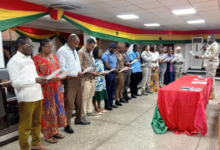Sanitation Ministry holds sensitisation workshop at Wa for stakeholders

The Ministry of Sanitation and Water Resources on Tuesday organised a day’s sensitisation workshop at Wa for stakeholders in the Upper West Region on the need to include the poor and vulnerable in basic sanitation services.
It was to review an existing Pro-Poor Document of 2018 in the implementation of the Community Led Total Sanitation (CLTS), to include elements that would favour the vulnerable in achieving enhanced sanitation.
A Deputy Director at the Environmental Health and Sanitation Directorate under the Ministry, Mr Kweku Quansah, said that sanitation was a cross cutting issue that needed the support of all stakeholders, including the vulnerable in society.
He explained that majority of the poor and vulnerable relied on unhygienic sanitary systems with inappropriate faecal sludge management system, adding that the same people were often the ones that were primarily affected by the environment they had polluted.
“Most poor and vulnerable people in society are unable to build their own household toilets due to disabilities, funding challenges, soil condition, lack of interest, among others,” he said.
According to Mr Quansah, the new guidelines for the basic sanitation needs of the poor and vulnerable had been developed based on the outcome of stakeholders consultation at the national, regional, district and community levels, under the auspices of the Ministry of Sanitation and Water Resources.
He said targeting the poor and vulnerable people in society would help reduce open defecation and improve the health and dignity of the populace in the country.
Mr Quansah urged the Metropolitan, Municipal and District Assemblies (MMDAs) to play a lead role in making resources available to support the poor and vulnerable groups in the various communities while urging the various Environmental Health Officers within the MDAs to ensure that the support reached the exact beneficiaries.
He encouraged the stakeholders to ensure that they worked together to achieve the country’s target of open defecation free status by 2030.
FROM RAFIA ABDUL-RAZAK, WA







